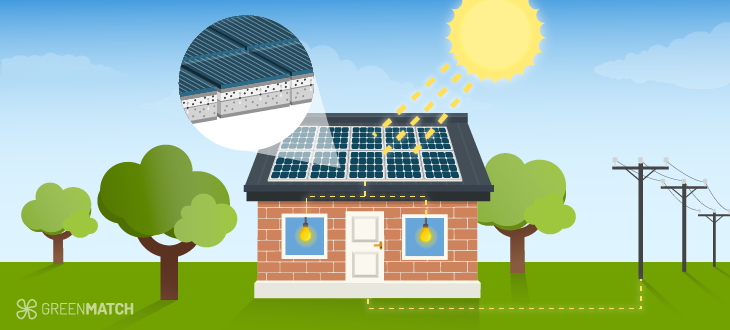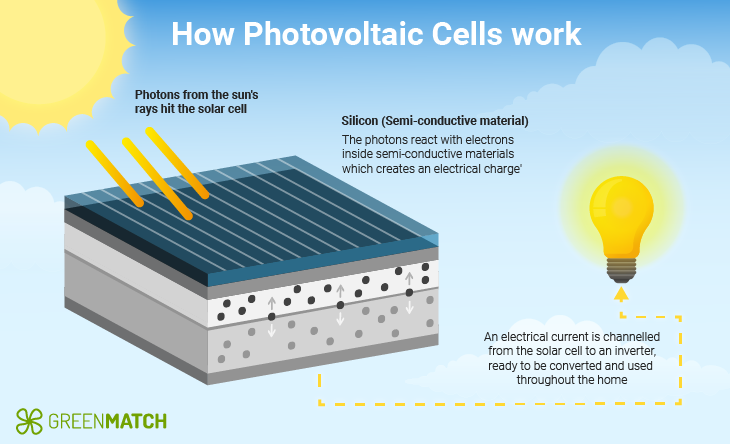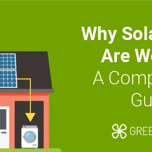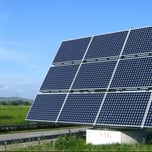Answer these simple questions and we will find you the BEST prices
Which type of solar quotes do you need?
It only takes 30 seconds
100% free with no obligation

Get up to 4 quotes by filling in only 1 quick form

Slash your energy bills by installing solar panels

For the average 2-3 bedroom house
- GreenMatch
- Solar Energy
- How is solar energy converted into electricity?
How is Solar Energy Converted into Electricity?


Solar power is one of the best technical advancements in renewable energy. By using the endless power of our sun, we can create electricity to run homes, businesses and more.
You might be familiar with seeing solar panels in the UK on roofs or placed in fields and gardens, but do you know how solar power is created?
Through a fascinating process known as photovoltaics, solar cells can take rays of sunlight and turn them into usable electricity.
In this article, we’ll explore precisely how photovoltaics work to convert solar energy into renewable electricity and why this process is so beneficial to us all.
What is solar energy?
Solar energy is a type of renewable energy that is harnessed from the sun's rays. It is a clean, abundant, and sustainable energy source that has the potential to power a significant portion of our electricity needs and help mitigate climate change.
Solar energy is considered renewable because it relies on the sun, continuously producing energy. In addition, unlike fossil fuels such as coal, oil, and natural gas, solar energy does not produce harmful greenhouse gases or other pollutants when converted into electricity. As a result, solar power plays a vital role in reducing carbon emissions.
Solar energy can be captured and converted into usable electricity or heat. When used in heating, the technology is known as ‘solar thermal’. Most applications of solar energy, however, are used to produce electricity.
How is solar energy converted into electricity?
Solar energy is converted into electricity through photovoltaics, which involves using solar cells (also known as photovoltaic cells). These single cells are multiplied to make up solar panels.
Each photovoltaic cell is made from semiconductive materials, such as silicon. There are usually two layers of material, one that is negatively charged and one positively charged (each known as a p-type and an n-type of semiconductor).
Using these materials means that when particles from the sun's rays (known as Photons) hit this material, it creates electric energy.
This happens because the semiconductive material contains electrons, which carry an electric charge. When introduced to the conductive materials, they move around, generating the electric current.

Step-by-step: How solar energy is converted to electricity
Now we understand how a solar cell creates an electric current. Let’s explore the steps involved in getting that energy into the home.
Storing solar energy
One of the downsides to powering your home with solar energy is that solar panels cannot produce electricity when there is no sunlight, for example, at night.
However, the solution to this issue is to use stored energy; you can do this in a few beneficial ways.
Solar Batteries
Depending on the number of solar panels you install on your roof, your solar panel system will likely produce more energy than you need during the day. You can store this excess energy in a solar battery.
These solar batteries store excess solar power for you to access whenever needed. This allows you to continue using clean, renewable energy throughout the night and decrease energy costs.
The benefit to this method is that you won’t need to access electricity from the National Grid, meaning you avoid volatile energy prices and always have a backup supply in case of power outages.
Grid Connection
There are also benefits to sending your excess energy back to the Grid. This method is often called ‘net metering’ or a ‘feed-in tariff’. These schemes allow homeowners who generate excess solar electricity to receive payment for selling power back to the grid.
In the UK, the most current scheme of this type is known as the ‘Smart Export Guarantee’ (SEG). Various suppliers will pay a set tariff for each unit of energy you can supply to the grid. Each supplier can offer a different tariff, so it’s worth looking for the best option.
In our article, Smart Export Guarantee Explained, please find out more about this scheme.
Benefits of solar energy
Owning a renewal system offers homeowners many benefits. This technology allows you to operate your home on a completely renewable, clean energy source, saving you hundreds of pounds a year on energy bills.
Here are some of the benefits of solar energy and solar panels:

Conclusions
The ability to turn the sun's rays into usable energy is a remarkable feat of technology. Using photovoltaics, we can create renewable energy for our homes, saving money and the environment.
Solar energy offers homeowners several benefits and transforms how we power everything, from appliances to whole businesses. By utilising storage options like solar batteries, we can extend the time we can use solar power and run even more technology on a renewable energy source.
Converting solar energy into electricity is a transformative step for renewable energy and enables people to live more sustainably. Lowering their carbon footprint and protecting the environment whilst saving money are the ideal starting points for a promising future for our planet.

Becky is an experienced SEO content writer specialising in sustainability and renewable trends. Her background in broadcast journalism inspires reliable content to help readers live more sustainably every day.
We strive to connect our customers with the right product and supplier. Would you like to be part of GreenMatch?

Stay up to date with energy saving tips and grant alerts
Receive offers, marketing and promotions via email from Leads.io about GreenMatch and our brands/partners to help you save.
Thank you for subscribing to our newsletter!
Your email has been successfully added to our list. We look forward to sharing our latest updates with you soon!




